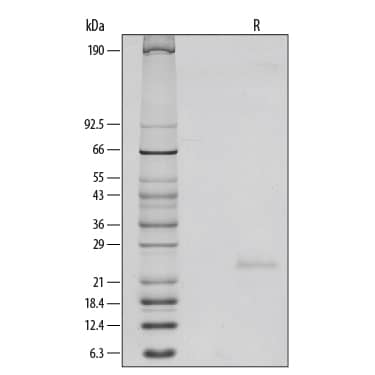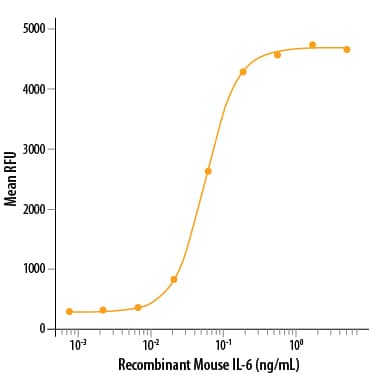Recombinant Mouse IL-6 Protein Best Seller
R&D Systems, part of Bio-Techne | Catalog # 406-ML

Key Product Details
Product Specifications
Source
Phe25-Thr211, with an N-terminal Met
Purity
Endotoxin Level
N-terminal Sequence Analysis
Predicted Molecular Mass
Activity
The ED50 for this effect is 10.0-100 pg/mL.
Reviewed Applications
Read 15 reviews rated 4.6 using 406-ML in the following applications:
Scientific Data Images for Recombinant Mouse IL-6 Protein
Recombinant Mouse IL-6 Protein Bioactivity
Recombinant Mouse IL-6 (Catalog # 406‑ML) stimulates cell proliferation of the T1165.85.2.1 mouse plasmacytoma cell line. The ED50 for this effect is 10.0-100 pg/mL.Recombinant Mouse IL-6 Protein SDS-PAGE
1 μg/lane of Recombinant Mouse IL-6 was resolved with SDS-PAGE under reducing (R) conditions and visualized by silver staining, showing a single band at 24 kDa.Formulation, Preparation and Storage
Carrier Free
What does CF mean?CF stands for Carrier Free (CF). We typically add Bovine Serum Albumin (BSA) as a carrier protein to our recombinant proteins. Adding a carrier protein enhances protein stability, increases shelf-life, and allows the recombinant protein to be stored at a more dilute concentration. The carrier free version does not contain BSA.
What formulation is right for me?In general, we advise purchasing the recombinant protein with BSA for use in cell or tissue culture, or as an ELISA standard. In contrast, the carrier free protein is recommended for applications, in which the presence of BSA could interfere.
Carrier: 406-ML
| Formulation | Lyophilized from a 0.2 μm filtered solution in Sodium Acetate and EDTA with Trehalose and with BSA as a carrier protein. |
| Reconstitution | Reconstitute at 100 μg/mL in sterile PBS containing at least 0.1% human or bovine serum albumin. |
| Shipping | The product is shipped at ambient temperature. Upon receipt, store it immediately at the temperature recommended below. |
| Stability & Storage | Use a manual defrost freezer and avoid repeated freeze-thaw cycles.
|
Carrier Free: 406-ML/CF
| Formulation | Supplied as a 0.2 μm filtered solution in Sodium Acetate and EDTA. |
| Shipping | The product is shipped with polar packs. Upon receipt, store it immediately at the temperature recommended below. |
| Stability & Storage | Do not freeze.
|
Background: IL-6
References
- Mansell, A. and B.J. Jenkins (2013) Cytokine Growth Factor Rev. 24:249.
- Schuett, H. et al. (2009) Thromb. Haemost. 102:215.
- Erta, M. et al. (2012) Int. J. Biol. Sci. 8:1254.
- Garbers, C. et al. (2012) Cytokine Growth Factor Rev. 23:85.
- Mihara, M. et al. (2012) Clin. Sci. (Lond.) 122:143.
- Chiu, C.P. et al. (1988) Proc. Natl. Acad. Sci. USA 85:7099.
- Simpson, R.J. et al. (1988) Eur. J. Biochem. 176:187.
- Van Snick, J. et al. (1988) Eur. J. Immunol. 18:193.
- Murakami, M. et al. (1993) Science 260:1808.
- Muller-Newen, G. (2003) Sci. STKE 2003:PE40.
- Mitsuyama, K. et al. (2006) Clin. Exp. Immunol. 143:125.
- Cerutti, A. et al. (1998) J. Immunol. 160:2145.
Long Name
Alternate Names
Entrez Gene IDs
Gene Symbol
UniProt
Additional IL-6 Products
Product Documents for Recombinant Mouse IL-6 Protein
Product Specific Notices for Recombinant Mouse IL-6 Protein
For research use only

